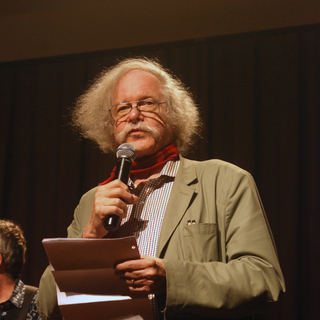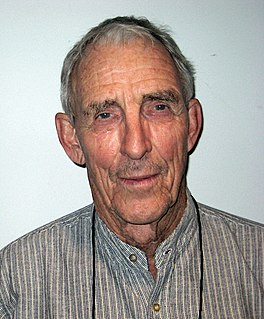Related Research Articles

Norman Kingsley Mailer was an American novelist, journalist, essayist, playwright, activist, filmmaker and actor. In a career spanning over six decades, Mailer had 11 best-selling books, at least one in each of the seven decades after World War II—more than any other post-war American writer.

Edward Sanders is an American poet, singer, activist, author, publisher and longtime member of the rock band the Fugs. He has been called a bridge between the Beat and hippie generations. Sanders is considered to have been active and "present at the counterculture's creation."
Susan Brownmiller is an American journalist, author and feminist activist best known for her 1975 book Against Our Will: Men, Women, and Rape. Brownmiller argues that rape had been previously defined by men rather than women, and that men use it as a means of perpetuating male dominance by keeping all women in a state of fear. The New York Public Library selected Against Our Will as one of 100 most important books of the 20th century.

The Armies of the Night: History as a Novel/The Novel as History is a nonfiction novel recounting the October 1967 March on the Pentagon written by Norman Mailer and published by New American Library in 1968. It won the Pulitzer Prize for General Non-fiction and the National Book Award in category Arts and Letters. Mailer's unique rendition of the non-fiction novel was perhaps his most successful example of new journalism, and received the most critical attention. In Cold Blood (1965) by Truman Capote and Hell's Angels (1966) by Hunter S. Thompson had already been published, and three months later Tom Wolfe would contribute The Electric Kool-Aid Acid Test (1968).

Peter Matthiessen was an American novelist, naturalist, wilderness writer, and zen teacher. A co-founder of the literary magazine The Paris Review, he was the only writer to have won the National Book Award in both nonfiction and fiction. He was also a prominent environmental activist.
Grove Press is an American publishing imprint that was founded in 1947. Imprints include: Black Cat, Evergreen, Venus Library, and Zebra. Barney Rosset purchased the company in 1951 and turned it into an alternative book press in the United States. He partnered with Richard Seaver to bring French literature to the United States. The Atlantic Monthly Press, under the aegis of its publisher, Morgan Entrekin, merged with Grove Press in 1991. Grove later became an imprint of the publisher Grove/Atlantic, Inc.

Barnet Lee "Barney" Rosset, Jr. was a pioneering American book and magazine publisher. An avant-garde taste maker, he founded Grove Press in 1951 and Evergreen Review in 1957, both of which gave him platforms for curating world-class and, in several cases, Nobel prize-winning work by authors including Samuel Beckett (1969), Pablo Neruda (1971), Octavio Paz (1990), Kenzaburō Ōe (1994) and Harold Pinter (2005).
The Evergreen Review is a U.S.-based literary magazine. Its publisher is John Oakes and its editor-in-chief is Dale Peck. The Evergreen Review was founded by Barney Rosset, publisher of Grove Press. It existed in print from 1957 until 1984, and was re-launched online in 1998, and again in 2017. Its lasting impact can be seen in the March–April 1960 issue, which included work by Albert Camus, Lawrence Ferlinghetti, Bertolt Brecht and LeRoi Jones, as well as Edward Albee's first play, The Zoo Story (1958). The Camus piece was a reprint of "Reflections on the Guillotine", first published in English in the Review in 1957 and reprinted on this occasion as the magazine's "contribution to the worldwide debate on the problem of capital punishment and, more specifically, the case of Caryl Whittier Chessman." Its commitment to the progressive side of the political spectrum has been consistent, with early stance for civil rights and against the Vietnam War. The image of Che Guevara that first appeared on the cover of its February 1968 issue, designed by Paul Davis and based on a photograph by Alberto Korda, became a popular symbol of resistance.
Dwight Macdonald was an American writer, editor, film critic, social critic, literary critic, philosopher, and activist. Macdonald was a member of the New York Intellectuals and editor of their leftist magazine Partisan Review for six years. He also contributed to other New York publications including Time, The New Yorker, The New York Review of Books, and Politics, a journal which he founded in 1944.
Josh Greenfeld was an author and screenwriter mostly known for his screenplay for the 1974 film Harry and Tonto along with Paul Mazursky, which earned them an Academy Award nomination and its star, Art Carney, the Oscar itself for Best Actor. Greenfeld also wrote Oh, God! Book II and the TV special Lovey and is the author of several books about his autistic son, Noah Greenfeld.
Martin Bauml Duberman is an American historian, biographer, playwright, and gay rights activist. Duberman is Professor of History Emeritus at Herbert Lehman College in the Bronx, New York City.
Richard Poirier was an American literary critic.

Kyudo Nakagawa, or Nakagawa Kyūdō, was a Japanese-born Rinzai rōshi who for many years led Soho Zen Buddhist Society, Inc. in Manhattan's Lower East Side.
Jack Gelber was an American playwright best known for his 1959 drama The Connection, depicting the life of drug-addicted jazz musicians. The first great success of the Living Theatre, the play was translated into five languages and produced in ten nations. Gelber continued to work and write in New York, where he also taught writing, directing and drama as a professor, chiefly at Brooklyn College, City University of New York, where he created the MFA program in playwriting. In 1999 he received the Edward Albee Last Frontier Playwright Award in recognition of his lifetime of achievements in theatre.
Ned Polsky was an American author and sociologist who wrote the 1969 book Hustlers, Beats, and Others, about political culture, criminology and pool hustlers. He was also known for his criticism of Norman Mailer's essay The White Negro, included with the essay in later collections of Mailer's work, and as an "insane Joyce fanatic" who memorized long passages from Finnegans Wake.
Richard Woodward Seaver was an American translator, editor and publisher. Seaver was instrumental in defying censorship, to bring to light works by authors such as Samuel Beckett, Jean Genet, Henry Miller, William S. Burroughs, Hubert Selby, Eugène Ionesco, E.M. Cioran, D.H. Lawrence, Jack Kerouac, Robert Coover, Harold Pinter and the Marquis de Sade.
Richard M. Elman was an American novelist, poet, journalist, and teacher. He was born in Brooklyn, New York. His parents were Yiddish-speaking and came to the United States at the turn of the 20th century from Russo-Poland. His boyhood is captured in his comic novel Fredi & Shirl & The Kids: An Autobiography In Fables.
James Campbell is a Scottish writer.
David W. Shetzline is an American author residing in Marcola, Oregon.
George Stade was an American literary scholar, critic, novelist and professor at Columbia University.
References
- ↑ "Four Men Shaking: Searching for Sanity with Samuel Beckett, Norman Mailer, and My Perfect Zen Teacher". Publishers Weekly. July 2019. Retrieved 2019-12-23.
- ↑ "Exorcising Beckett". Samuel-beckett.net.
- ↑ Writers and Editors War Tax Protest, 30 January 1968, New York Post
- ↑ "Bookshelf". Columbia College Today. 2019-12-06. Retrieved 2022-06-14.